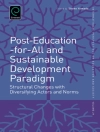′There have been few critical engagements with the concept of creativity in recent years, so the authors provide an important contribution in drawing attention to what is arguably at the heart of much of what we most value in culture′
– Douglas Kellner, University of California, Los Angeles
′In this important book, Keith Negus and Michael Pickering challenge commonplace assumptions about creativity and casual invocations of genius. They give comfort neither to popular wisdom nor to academic convention. Drawing on the work of philosophers, sociologists, political theorists and economists, as well as artists, musicians and novelists, they raise profound questions about the very ideas which sustain our understanding of art and culture′
– Professor John Street, University of East Anglia
′It′s all too rare to read a cultural studies book that offers any real originality. This one achieves this, not only by addressing debates and sources neglected in the field, but also by traversing high and low culture, and all points between′
– Dave Hesmondhalgh, The Open University
Creativity has become a buzzword and key issue in debates about cultural policy, human growth and the media and cultural industries. It has also become a very misused term used to describe anything from musical and artistic genius, to shady financial accounting, to the teaching of children and the management of employees.
But what does it mean?
Negus and Pickering provide a clear and logical way of understanding what we describe as creative, and how this term has become central to attaching cultural value. Their book:
· Develops an approach which enables us to think of creativity as both ordinary and exceptional
· Focuses on creativity as a way of rethinking key concepts in the study of culture such as:
Convention; innovation; tradition and experience.
This book is useful to those studying Media and Cultural Studies who need to understand Cultural Production, Communication, Popular Culture and Cultural Theory.
İçerik tablosu
Creation
Experience
Industry
Convention
Tradition
Division
Genius
Yazar hakkında
Michael has published over a hundred articles and chapters in edited collections. These cover a number of areas including popular music, racism and popular culture, imperialism and theatrical history, Mass Observation, working-class writing, news and documentary, stereotyping and representation, humour and comedy, creativity and cultural production, media and memory, and historical hermeneutics. Overall his work covers the fields of media and communication studies, social and cultural history, and the sociology of art and culture. Michael has also written extensively on research methods, having edited collections on methods in cultural studies and memory studies, and been co-author of Researching Communications (Bloomsbury, 2007), along with David Deacon, Peter Golding and Graham Murdock. He has recently completed a major AHRC research project on music in the workplace, with Marek Korczynski of Nottingham University and Emma Robertson of La Trobe University. Their book, Rhythms of Labour: The History of Music at Work in Britain, is published by Cambridge University Press. With Emily Keightley, Michael is currently involved in a research project funded by the Leverhulme Trust on media and memory. Their book The Mnemonic Imagination is published by Palgrave Macmillan.












